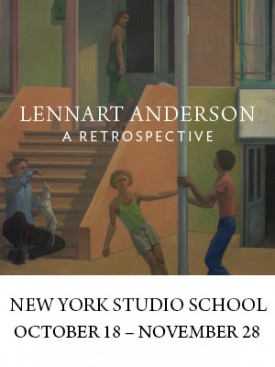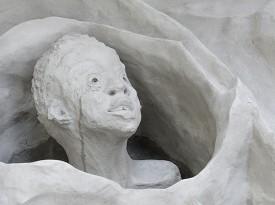
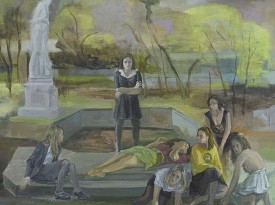
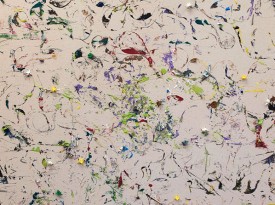
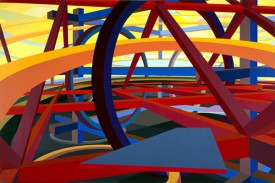
Al Held: Paintings, 1979-1985 at Paul Kasmin Gallery
The interplay of colors and contrasting directions endows the open spaces with their own specific movements. The entire composition is cropped cinematically to add implied drama to what can only be called a scene.
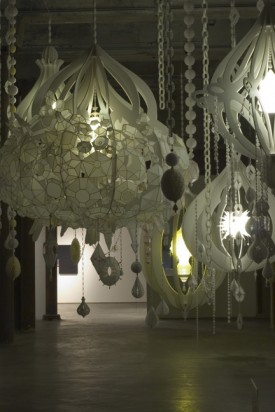
Kirsten Hassenfeld at Smack Mellon
January 17-February 22, 2009 92 Plymouth Street, at Washington Street Brooklyn, NY, 718 834 8761 It is hard to imagine an installation looking better in the industrial Smack Mellon main exhibition hall than Kirsten Hassenfeld’s current installation, Dans La Lune. Smack Mellon is a venue of raw physicality, with towering concrete columns framed in industrial steel, … Continued
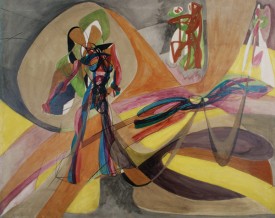
Stanley William Hayter in America: Paintings, Drawings and Prints, 1940-1950 at Francis M. Naumann Fine Art
Naumann has had the courage and good taste to break the medium barrier between Hayter’s experiments in printmaking, drawing and painting by presenting his work chronologically, regardless of – and mixing up – medium and support.
The resulting hang is very refreshing, and vindicating, to those afficionados sick to the hind teeth of Hayter being dismissed as a “technical wizard” in the etching studio, and therefore not, by extension, a “real” artist outside of it.

Matt Mullican: A Drawing Translates the Way of Thinking at The Drawing Center
When Mullican asserts in writing that the “preoccupation with materials and processes seems to clutter up the phenomenon of what interests me,” he is making it clear to us that no individual person or thing can contain the entirety of that which engages him. Thus the artist reworks appearances as a means of describing the gestalt that both energizes and evades his hand.
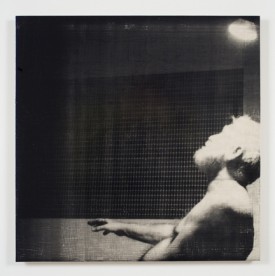
R. H. Quaytman: chapter 12: iamb at Miguel Abreu Gallery
Quaytman works in a mode of painting/silkscreen hybrid, an at once middle-brow and mass-produced liminal form that is ideologically adrift between the elite and the unique in a way that recalls Warhol. The show quietly crackles with ideas about production; perception and legibility; the nature of the “image;” and the play between painterly and photographic values.
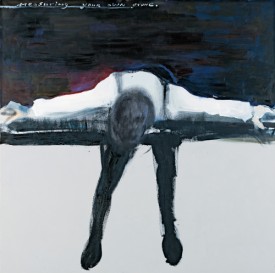
Marlene Dumas at MoMA and Elizabeth Peyton at the New Museum
Dumas and Peyton are united in their limitations as well as their strengths—and, arguably, in their capacity to ensure that their limitations are strengths. Dumas’s photo-dependency gives her imagery political edge. Denial of sensory depth almost punishes viewers for yearning for it, reminding them of the urgencies of injustice and exploitation that this art – and their consciences – should be addressing. Peyton’s style wallows in its own patheticism, as if cloying, ephemeral, illustration-technique are symptoms of self-pity. Such knowingly retarded means sit perfectly with the basically adolescent emotion she taps, which is that of star-struck infatuation.
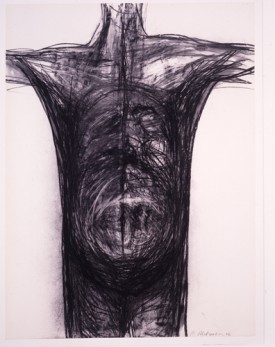
Magdalena Abakanowicz: The Reality of Dreams at Mary and Leigh Block Museum of Art, Northwestern University
These monumental drawings consist of interwoven lines made with charcoal or gouache that tangle and bind together to form strange organic beings. Forms allude to a tree trunk, a human torso, a flower, or an insect; they explore the ambivalence between nature’s capacity to produce the mysterious pulsating of life which is simultaneously haunted by the treachery of death.
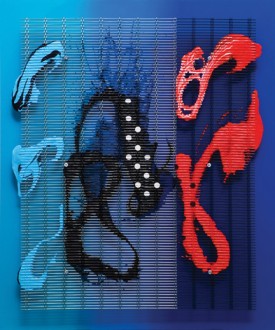
William Tillyer: The Cadiz Caprices at Jacobson Howard Gallery
There are few abstract painters at work today who manage to push both metaphor and literalism so hard, simultaneously, as William Tillyer.
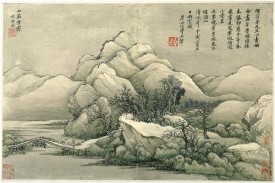
Landscapes Clear and Radiant: The Art of Wang Hui at the Metropolitan Museum of Art
The attractiveness of the towering, tree covered mountains in Landscape after Wang Meng’s “Travelers amid Autumn Mountains” is self-evident. But if you cannot also see how this is a copy of a fourteen century imitation of Dong Yuan’s 10th century Travelers amid Autumn Mountains, then who knows what you are missing.
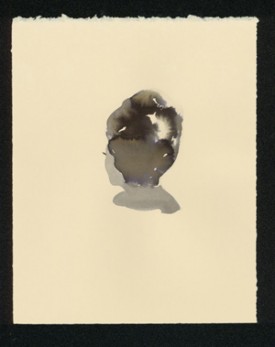
Lorna Simpson: Ink at Salon 94 and Salon 94 Freemans
The tensions between intimate and public, between information and interpretation, in Simpson’s drawings of women’s hair take on a different meaning in a second body of work in what the artist calls the “orchestrated theatrical disaster” of war.

